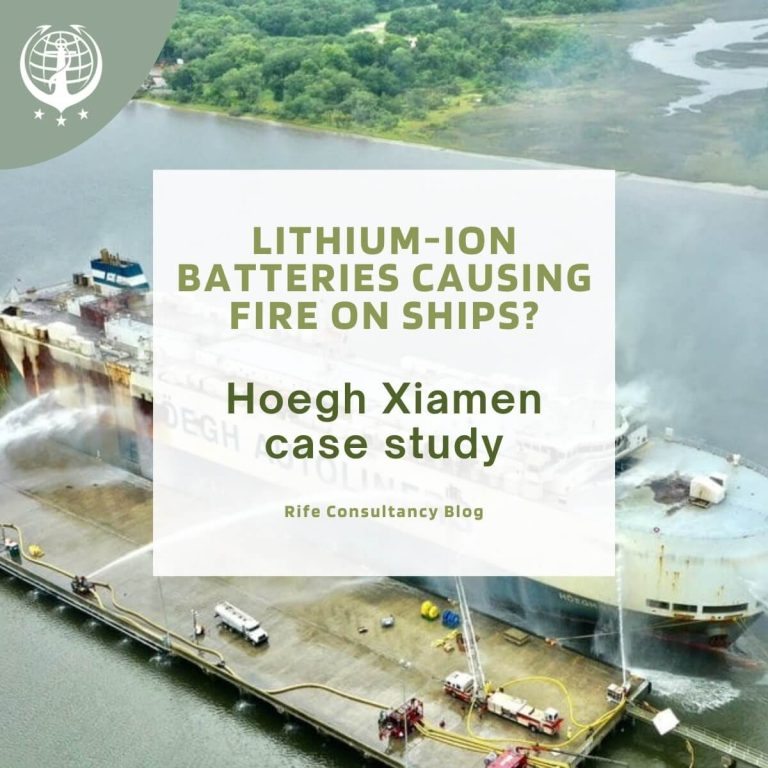
Lithium-Ion Batteries causing fire on ships? – Höegh Xiamen Case Study
Failure to disconnect vehicle batteries caused fire on board and led to a loss of $40 million dollars: Said NTSB in a recent report published from its investigation into the June 2020 car carrier fire in Jacksonville, Florida.
Table of Contents
What Exactly Happened?

On June 4, 2020, at around 15:30 EST, the crew of the 600-foot-long, Norwegian-flagged roll on/roll-off vehicle carrier Höegh Xiamen was preparing to depart the Blount Island Horizon Terminal in Jacksonville, Florida, en route to Baltimore, Maryland, when they noticed smoke coming from a ventilation housing for one of the exhaust trunks that ran from deck 12 (the weather deck) to one of the cargo decks.
The crew members of the ship noticed a fire on deck 8, where used vehicles were stored. The crew tried to fight the fire but were stopped by heavy smoke. The Jacksonville Fire and Rescue Department sent their shoreside fire department team and relieved the crew. Eventually, the fire spread to other cargo decks and accommodations; and continued to burn for 8 days.
Shoreside firemen used fire hoses to penetrate cargo decks, and an explosion injured nine firefighters, five of whom were critically hurt. Firefighters then took a defensive approach, cooling exposed exterior surfaces. On June 12, the fire was put out after more than a week.
The Höegh Xiamen was deemed a total loss with a load of 2,420 used vehicles worth at $40 million, and the vessel was towed to Turkey to be recycled in August 2020.
Probable Cause of Fire According to NTSB
The inquiry by the NTSB was documented in Marine Accident Report 21/04, which was released on Thursday. The Höegh Xiamen’s crew spotted smoke coming from the ventilation housing while preparing to leave port for Baltimore, Maryland, according to the report.
Many of the cars brought onboard the vessel had batteries that were not disconnected and secured according to regulations, increasing the potential of electrical arcing and component failures, according to the NTSB. According to the NTSB, both the loading staff and the crew missed opportunities to address these dangers during loading procedures.
The examination also revealed that the fire detection was delayed because the boats’ fire detection systems had not been restarted after loading. The Höegh Xiamen’s master did not have contact information for search and rescue officials and did not know how to report a fire to local authorities, therefore the Jacksonville Fire and Rescue Department’s response to the catastrophe was slowed.
The NTSB defined that Grimaldi Deep Sea’s (who time chartered the vessel) and SSA Atlantic’s (Grimaldi’s stevedores contractor) inefficient oversight of longshoremen was the possible cause of the fire, as they failed to notice that Grimaldi’s vehicle battery securement practises were not being followed.
An incorrectly disconnected battery in a used vehicle on cargo deck 8 caused an electrical problem. The crew did not immediately reactivate the vessel’s fire detection system once the loading was completed, which contributed to the delay in detecting the fire. The master’s choice to postpone the release of the carbon dioxide fixed fire extinguishing equipment contributed to the fire’s spread, said NTSB.
Safety issues identified in the report include:
- Training for and oversight of vehicle battery securement
- Regulatory exceptions for used and damaged flammable liquid-powered vehicles
- Fire detection system deactivation during cargo loading
- Effective emergency distress calls
Recommendations by NTSB
The Pipeline and Hazardous Materials Safety Administration, the United States Coast Guard, and the National Maritime Safety Association each received one recommendation from the NTSB; Grimaldi Deep Sea received two recommendations; and Höegh Technical Management received three recommendations.
The NTSB recommended that the firms improve vehicle loading oversight and train workers involved in battery securement for old and damaged cars. Improved regulations for vehicle carriers that carry used automobiles were among the NTSB’s recommendations to federal authorities.
The NTSB recommended that the vessel’s operator revise their protocols for reactivating fire detecting equipment and ensure that emergency contact information is readily available for bridge personnel.
- Recommendation to the Pipeline and Hazardous Materials Safety Administration
Remove the exemption for used and damaged flammable-liquid-powered vehicles carried by roll-on/roll-off vehicle carriers from Title 49 Code of Federal Regulations 176.905(i).
- Recommendation to the US Coast Guard
Recommend to the International Maritime Organization to abolish special provision 961 of the International Maritime Dangerous Goods Code for old and damaged flammable-liquid-powered vehicles carried by roll-on/roll-off vehicle carriers.
- Recommendation to the National Maritime Safety Association
Inform people about the Höegh Xiamen accident and encourage them to implement battery securement protocols, as well as a way to guarantee that they are followed through sufficient vehicle loading and battery securement supervision.
- Recommendation to the Grimaldi Deep Sea
To provide higher fire safety aboard vehicle carriers, develop a training program for any vehicle preparation staff entrusted with supervising and completing vehicle battery securement.
- Recommendation to the Höegh Technical Management
Revise the “Vehicle Lashing Inspection Technique” to incorporate a procedure for ensuring that all vehicle batteries are removed prior to departure, and educate all crew members on the new procedure.
A Similar Case of Felicity Ace Fire Incident

Felicity Ace caught fire on February 17, 2022, and was abandoned in the North Atlantic near the Azores. After the vehicle carrier caught fire around 90 nautical miles southwest of the Azores island of Faial on Wednesday morning, all 22 crew members of the M/V Felicity Ace safely abandoned the ship and were picked up by a tanker.
According to an internal communication from Volkswagen AG’s U.S. operations, the ship had 3,965 automobiles on board. Along with 4000 vehicles including Porches, Audis, and Bentleys, Felicity Ace was carrying lithium-ion batteries. Firemen were struggling to put out the fire that broke on the ship.
Cabeças claimed lithium-ion batteries in the electric cars on board were “keeping the fire alive,” adding that extinguishing equipment was on its way. However, it was not clear whether the batteries sparked fire or not.
According to a risk analyst at Russell Group, the Felicity Ace fire could lead to a loss of at least $115 million for Volkswagen, Porsche, Audi, and Lamborghini. The vessel was carrying around 4000 vehicles – the exact number was not disclosed. According to a study by the Russell Group in the United Kingdom, the entire financial worth of commodities on board the ship is believed to be $438 million, with automobiles and commercial vehicles accounting for an estimated $401 million.
The Felicity Ace car carrier sank in the Atlantic Ocean on March 1, 2022. The ship’s manager, MOL Ship Management (Singapore) stated that the vessel sank about 9 a.m. local time on Tuesday, roughly 220 nautical miles off the coast of the Azores Islands, according to preliminary information from the on-site recovery team.
According to reports, several automobiles on board were electric vehicles with lithium-ion batteries, complicating firefighting attempts. We may never know what started the fire or contributed to its spread because the ship is now at the bottom of the ocean.
“Further information will be provided as it becomes available,” MOL said in its update.
Also Read: 4 Sponsorship Exams you must applu in 2023
Electric Vehicles and Maritime Transportation – Potential Fire Hazards
Onboard a ship, a fire may be disastrous. Many types of fires have standard firefighting procedures, however unique dangers arise as a result of innovative systems onboard or varied cargoes. The transport of electric vehicles (EV) onto roll-on/roll-off (ro-ro) ships is one of these developing concerns.
The German Federal Ministry of Transport, Building and Urban Development commissioned a research in 2013 to see if transporting electric vehicles onboard ro-pax or ro-ro vessels increased the danger of fire. The researchers came to the conclusion that transporting electric cars (BEV and HEV) increases the threat of fire.
The research also included a review of extra firefighting measures onboard ro-pax and ro-ro boats, as well as fire protection and firefighting methods.
From this study, it is crucial to know that if a lithium ion battery catches fire, it will reach extremely high temperatures, emit hazardous fumes, and be inextinguishable.
Click here to join our Telegram chanel
You will get information, news, and support related to Merchant Navy.
